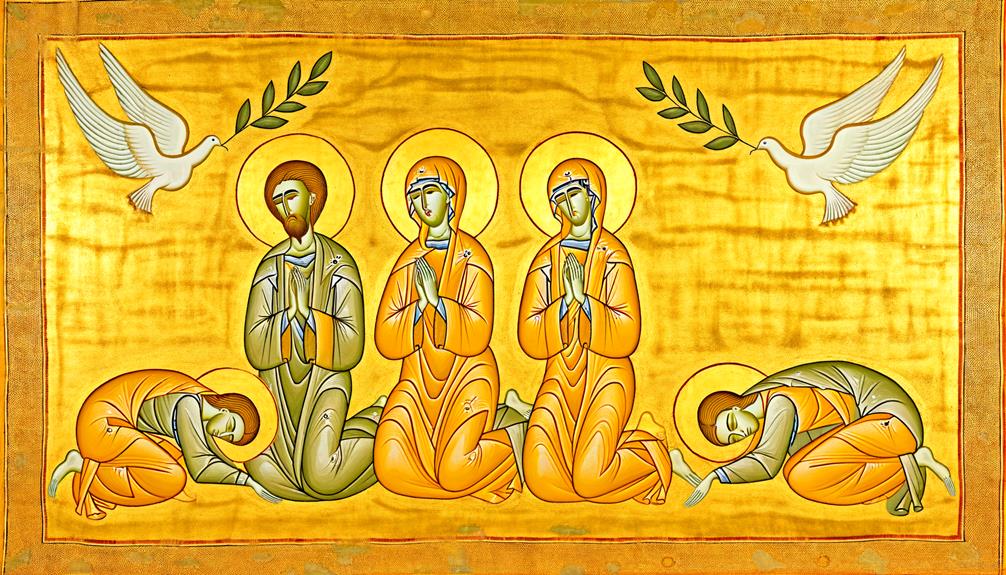Meaning Of Pius In The Bible: Name Origins
The term ‘Pius’ in the Bible, derived from the Latin ‘pius’, signifies devotion, humility, and a sense of duty toward God and community. This concept is deeply rooted in both the Old and New Scriptures, mirroring figures such as Abraham and Paul who exemplify unwavering faith and righteousness.
Theologically, it aligns with notions of godliness (‘eusebeia’) and holiness (‘hosios’) in Christian thought, emphasizing an ethical and devout life. This spiritual and moral framework was central to early Christian community values and continues to shape contemporary Christian virtues, offering a richer understanding of piety’s role and significance in biblical narratives.
Discover the broader implications of ‘Pius’ across Christian tradition.

Meaning of Pius in the Bible: Devotion, Godliness, and Reverence
| Aspect | Description |
|---|---|
| Name | Pius |
| Meaning | Devout, godly, dutiful (Latin origin) |
| Biblical Presence | Not directly mentioned as a person in the Bible |
| Spiritual Connotation | Associated with piety, holiness, and reverence for God |
| Related Concepts | Righteousness, faithfulness, devotion |
| Theological Use | Describes a lifestyle or character aligned with God’s will |
| Symbolism | Inner holiness, obedience, reverent fear of the Lord |
Definition of Pius

Although the name Pius is not explicitly found in biblical texts, its origins and implications can be traced back to its Latin roots, where it denotes a sense of dutifulness, reverence, and piety, characteristics highly valued in Christian theology.
The term encapsulates the essence of moral and spiritual devotion, reflecting an individual’s adherence to divine commandments and ethical conduct. In the historical context of early Christianity, such virtues were instrumental in shaping the moral fabric of the community.
Theologically, piety represents a profound relationship with God, characterized by unwavering faith, humility, and obedience.
Therefore, while the specific name may be absent from Scripture, the ideals it embodies are deeply interwoven into the biblical narrative and Christian moral teachings.
Etymology and Origins

Rooted in Latin, the name Pius derives from the word ‘pius,’ which signifies dutifulness and reverence, encapsulating the virtues of piety and devotion that are fundamental to Christian ethical teachings.
The etymology of ‘pius’ can be traced back to ancient Roman culture, where it denoted a sense of familial and societal duty, extending into religious observance. This term was later adopted into Christian theological language, reflecting the integral role of piety within scriptural contexts.
The name Pius, consequently, embodies a historical continuity of moral and spiritual obligations, bridging pre-Christian Roman virtues with Christian doctrinal emphasis on devout living.
Understanding its roots facilitates a deeper appreciation of its usage in biblical and ecclesiastical traditions.
Pius in Christian Tradition

The concept of ‘Pius‘ has been pivotal within Christian tradition, influenced by its historical prominence in early ecclesiastical writings and theological discourse.
From its roots in early Christian texts to its nuanced interpretations in contemporary theology, ‘Pius’ embodies a synthesis of devout piety and moral rectitude.
This discussion will explore the term’s evolution, examining its usage among early Church Fathers and its relevance in modern Christian thought.
Historical Context of Pius
Emerging prominently in Christian tradition, the name Pius has been historically associated with numerous early saints and several popes who embodied the virtue of piety and devotion to God. This association reflects a rich tapestry of religious and historical significance, painting a vivid picture of Christian reverence and steadfast faith.
- St. Pius I: An early pope who upheld orthodoxy against Gnostic heresies.
- Pope Pius V: Known for his role in the Counter-Reformation and the Battle of Lepanto.
- Pius IX: Longest-reigning elected pope, pivotal in defining the Immaculate Conception.
- Pius XII: Guided the Church through the tumultuous era of World War II.
These figures collectively underscore the enduring legacy of piety within Christianity.
Pius in Early Writings
Examining early Christian writings reveals that the name Pius was often synonymous with deep religious devotion and unwavering adherence to Christian doctrine, illustrating a profound commitment to faith.
Texts from the Patristic era frequently reference Pius to commend individuals for their piety and virtue.
Church fathers such as Tertullian and Origen employed the term to highlight exemplary fidelity to Christian teachings amidst persecution.
Theological treatises from this period illustrate how Pius became emblematic of a steadfast spiritual journey, reflecting a life dedicated to divine service.
Such usage underscores the integral role of personal holiness in early Christian communities, where Pius was not merely a name but a representation of the embodiment of Christian values.
Modern Interpretations of Pius
Building upon the rich legacy of early Christian writings, contemporary interpretations of Pius continue to emphasize its connotations of devout piety and unwavering commitment to faith within modern Christian tradition.
The term ‘Pius’ evokes a profound sense of:
- Reverence for divine teachings, reflecting a life dedicated to scriptural adherence.
- Spiritual discipline, embodying practices such as prayer, fasting, and meditation.
- Moral integrity, showcasing ethical behavior aligned with Christian virtues.
- Community service, highlighting acts of charity and compassion towards others.
These attributes collectively illustrate how Pius remains a pivotal concept, deeply ingrained in theological discourse and ecclesiastical practice, serving as a guiding principle for believers seeking to emulate Christ-like devotion in contemporary contexts.
Biblical Synonyms for Pius

In exploring Biblical synonyms for ‘Pius,’ it is essential to contemplate terms such as ‘godly,’ ‘devout,’ and ‘righteous,’ each carrying distinct connotations within the scriptural context.
‘Godly’ often emphasizes a life lived in reverence and alignment with divine principles, as seen in Psalms and Proverbs.
‘Devout’ highlights a deep, heartfelt commitment to spiritual practices and worship, exemplified in the New Covenant’s portrayal of early Christians in Acts.
‘Righteous’ conveys moral integrity and just behavior, frequently associated with figures like Job and Noah.
These terms collectively enrich our understanding of ‘Pius,’ illustrating a spectrum of piety that encompasses both inner devotion and outward ethical conduct, deeply rooted in Biblical tradition and theology.
Pius in Old Testament

Examining the concept of ‘pius’ within the Old Scriptures necessitates an exploration of its Hebrew context, where terms such as ‘chasid’ convey notions of piety and devoutness.
Remarkable biblical figures, including Abraham and David, exemplify this virtue through their unwavering faith and adherence to God’s commands.
This analysis will further illuminate how Old Scriptures values of righteousness, mercy, and obedience align with the broader understanding of piety in ancient Israelite society.
Pius in Hebrew Context
The concept of ‘Pius’ in the Old Scriptures is not directly referenced by the term itself but can be understood through the Hebrew notion of piety and righteousness, often depicted by the word ‘tzaddik’ (צַדהּיק), which denotes a person who is just, righteous, and devout in their adherence to God’s commandments.
This term embodies:
- Moral integrity: Demonstrated through unwavering adherence to ethical principles.
- Devotion to God: Evidenced by regular prayer and temple worship.
- Social justice: Commitment to fairness and equity in societal dealings.
- Compassion: Showing mercy and kindness to the less fortunate.
These attributes collectively illustrate the Hebrew conception of piety, reflecting deep theological and cultural values within the Old Canon.
Biblical Figures Named Pius
Despite the extensive genealogies and detailed narratives within the Old Scriptures, there are no specific figures directly named ‘Pius,’ underscoring the importance of understanding the attributes associated with piety through other named individuals exemplifying righteousness and devoutness.
Figures such as Noah, Abraham, and Moses embody the essence of ‘pius’ through their unwavering faith and obedience to God. Their lives offer a paradigm of piety, serving as exemplars for later theological interpretations.
| Biblical Figure | Key Attribute |
|---|---|
| Noah | Obedience to God |
| Abraham | Faithfulness |
| Moses | Devout Leadership |
These figures highlight the multifaceted nature of piety, revealing how devotion, trust, and adherence to divine commands shape the biblical understanding of righteousness.
Pius and Old Testament Values
Understanding ‘pius’ within the context of Old Scriptures values necessitates a thorough exploration of the theological virtues and moral principles that guided the lives of its most righteous figures.
The Old Scriptures paint a vivid picture of piety through the adherence to divine commandments and unwavering faith in God. These values were exemplified by key figures whose lives emulated the essence of piety:
- Abraham’s unwavering faith and obedience to God’s call.
- Moses’ dedication to leading the Israelites and receiving divine laws.
- David’s heartfelt repentance and pursuit of righteousness.
- Joseph’s integrity and forgiveness amidst adversity.
These elements collectively underscore the Old Scriptures’ portrayal of piety as a harmonious blend of faith, obedience, and moral integrity.
Pius in New Testament

Frequently overlooked in Christian scripture studies, the term ‘pius’ carries significant theological implications and historical resonance, warranting a closer examination of its usage and underlying meaning within the biblical writings.
Although ‘pius’ itself is not directly mentioned, its conceptual equivalents manifest through Greek terms such as ‘eusebeia’ (godliness) and ‘hosios’ (holy). These terms emphasize a devout life aligned with God’s will, reflecting the early Christian emphasis on ethical conduct and spiritual integrity.
The Christian scripture, particularly in Pauline epistles, often contrasts godliness with worldly behavior, thereby underscoring the transformative power of faith.
Understanding these nuances offers deeper insight into the early Christian community’s values and their interpretation of piety as a cornerstone of spiritual life.
Theological Interpretations

Building upon the conceptual equivalents of ‘pius’ in the New Scriptures, theological interpretations of these terms reveal a profound interplay between ethical conduct and spiritual devotion, which is pivotal for comprehending the early Christian ethos. This duality underscores the essence of living a life that is both morally upright and deeply spiritual.
Theological scholars have identified several key aspects of this interplay:
- Moral rectitude: Upholding ethical standards in everyday interactions.
- Devotional practices: Engaging in prayer, worship, and other spiritual disciplines.
- Community service: Demonstrating love and support within the Christian community.
- Sacrificial living: Prioritizing others’ needs over personal desires.
These elements collectively illustrate the multifaceted nature of ‘pius’ within a theological framework.
Pius and Daily Life

In examining the integration of ‘pius’ into daily life, it becomes evident that the early Christians meticulously wove their ethical and spiritual commitments into the fabric of their everyday existence.
Rooted in a profound sense of duty to God, their piety manifested in practices like communal worship, acts of charity, and moral rectitude.
Historical records and biblical texts illustrate how these believers sought to embody their faith through consistent prayer, scripture study, and adherence to Christ’s teachings.
Theologically, this daily embodiment of ‘pius‘ reflects an intrinsic belief that one’s faith must permeate all aspects of life, not merely in moments of worship but in every thought, action, and interaction, thereby transforming ordinary life into a continual act of devotion.
Examples of Pious Figures

The history of Christianity is replete with exemplary figures whose lives epitomize the essence of ‘pius,’ serving as profound models of faith, devotion, and moral integrity. These individuals, through their unwavering commitment to divine principles, offer rich insights into the lived experience of piety.
Among them, several stand out:
- Abraham: His willingness to sacrifice Isaac demonstrates ultimate obedience and faith.
- Moses: Leading the Israelites out of Egypt symbolizes relentless devotion to God’s command.
- David: His penitence and heart for God highlight sincere repentance and worship.
- Mary, Mother of Jesus: Exemplifies ultimate submission and faith in God’s plan.
These figures provide timeless examples of piety in action.
Conclusion
In the grand tapestry of biblical lore, ‘pius’ stands as a beacon of devoutness and sacred fidelity.
Rooted in ancient etymology and woven through the Old and New Scriptures, it encapsulates the virtues of piety and unwavering faith.
Through the prism of theological interpretation, ‘pius’ transcends mere definition to become a guiding star for daily life.
From the annals of scripture, pious figures shine forth, illuminating the path of righteousness and spiritual commitment.






